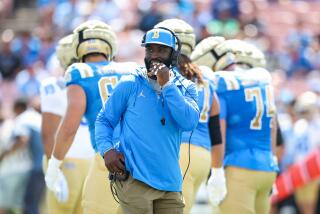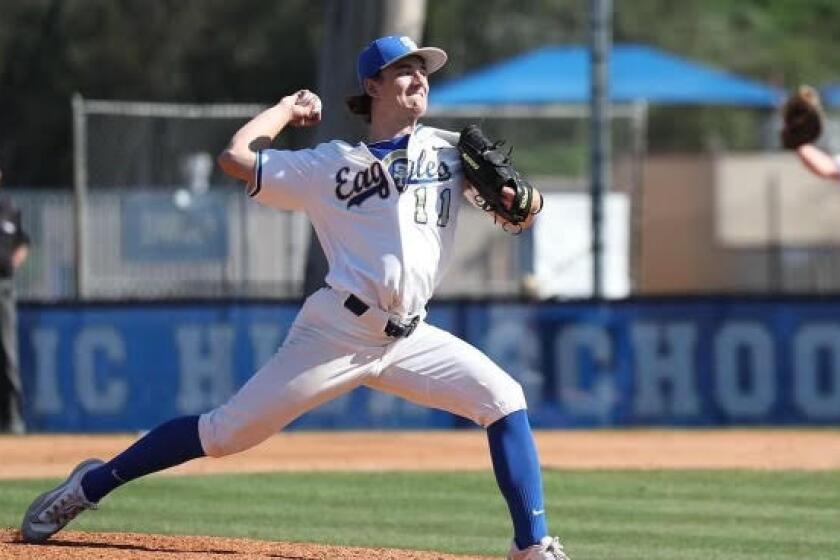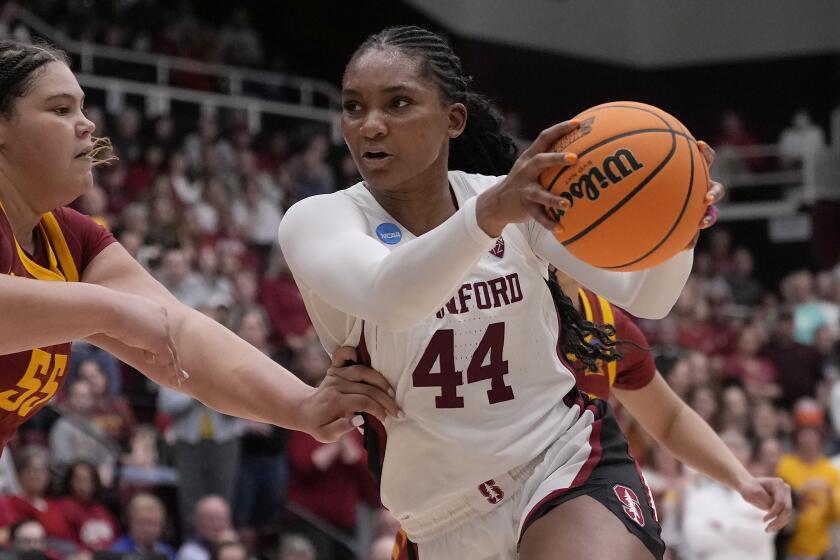PA Announcer Goes to Bat in Pa. : Sports: Behind Little League World Series mike, Merle Sanders roots for Northridge.
As unabashedly excited as the youngsters on the playing field, 63-year-old Merle Sanders overlooked a cardinal rule before beginning his first game as official public address announcer Monday at the Little League World Series.
He forgot to use the restroom.
“I prayed the game wouldn’t go into extra innings,” said Sanders, a Mission Hills resident and Little League volunteer since the first of his four sons began to play in 1969.
It didn’t--Chinese Taipei defeated Nova Scotia, Canada, 4 to 1--and Sanders was able to announce the following game in a more relaxed fashion.
Sanders can be excused the oversight. Like many others here, he has taken volunteerism to its pinnacle.
With no professional announcing experience and no formal training, in 1979 he began announcing games in the Mission Hills league. He moved up to the Western Regional in San Bernardino in 1981 and then, five years ago, began serving as assistant announcer of the Little League World Series.
He has never received a dime for his work and announcing is only part of that travail. Sanders’ primary role in Little League: For 16 years, he has been administrator of District 40, which encompasses leagues from Woodland Hills to San Fernando.
District 40 also includes the Northridge Little League all-stars, who last week became the Western Regional champions and continued on to Williamsport and the World Series. It is the first time during Sanders’ tenure as district administrator that a team in his purview has made it that far.
Luckily, Sanders has no conflict-of-interest problems in announcing the Northridge games because in Little League--as in professional sports--the public address announcer offers no commentary, simply announcing each player. He freely admits to being biased.
“I want Northridge to win, absolutely,” said Sanders, whose wife, Sylvia, congratulates the Northridge families during games wearing a T-shirt that boasts that the team possesses “District 40 California Earthquake Power.”
But to give Sanders time to root for the home team, his announcing of the Northridge games will be limited.
Of the four games on each of the tournament’s first three days, Sanders will announce just two, leaving Northridge games to his assistant. If the team advances to the national championship game on Thursday, Sanders would step back in front of the microphone.
Public address announcing is drastically different than broadcasting: The PA announcer talks only to people in attendance--not those watching on television--and he does not describe the action. It does, however, have its own challenges.
“The most important aspect is to pronounce every boy’s name correctly,” said Sanders, who goes into the dugout before each game and asks each player to pronounce his own name. “If a boy’s name is mispronounced, he cringes.”
To the casual observer, the names of foreign players, especially those from Taipei playing Monday, would seem to be the most difficult. But Sanders says any name can be deceiving.
“The pitcher from Virginia’s name is pronounced Wisher , but it is spelled W-E-I-S-H-A-R,” he said.
Although they are surely thicker-skinned than the young players, umpires--who come to the series from all over the world--also deserve some name recognition, Sanders believes. The home plate umpire in Monday’s second game said that Sanders was the first U.S. announcer to pronounce his name correctly.
“He got it right, yes he did,” said Wilfredo Alicea of Puerto Rico.
Sanders had a hard act to follow. Cliff Glier, who served as official announcer from 1968 until his death last year, became known as the “Voice of Little League Baseball” during his tenure. Dr. Creighton Hale, CEO of Little League Baseball Inc., knew he had to choose carefully because, after all, this is something of a lifetime appointment.
“As far as I’m concerned, the job is Merle’s for as long as he’d like it,” Hale said. “He is a wonderful, wonderful person, very low-key and very dedicated.”
Sanders said that even though he had been Glier’s assistant, he was still shocked when he opened a letter from Hale in June offering him the non-paying position. The post takes about one week’s work a year and offers only one perquisite: As assistant, Sanders had to pay his own way; as top PA announcer, the expenses--air fare, hotel and meals--are on the house.
More to Read
Get our high school sports newsletter
Prep Rally is devoted to the SoCal high school sports experience, bringing you scores, stories and a behind-the-scenes look at what makes prep sports so popular.
You may occasionally receive promotional content from the Los Angeles Times.







